The Democratic primary was a wild, unpredictable ride – except the result
The coronavirus pandemic effectively ended the race but a historically diverse field had faced off before narrowing to two white men in their 70s
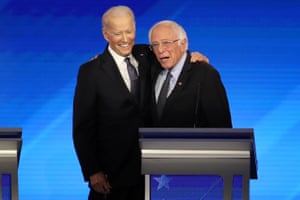
Photograph: Joe Raedle/Getty Images
The Democratic odyssey to choose a nominee delivered one final surprise this week: a predictable ending.
Joe Biden, the frontrunner for the entire campaign season minus a rocky four-week interlude, is the last Democrat standing after Bernie Sanders suspended his presidential bid on Wednesday.
But the result belies what was, by objective measure, no ordinary quest for power. Epic in scale and rich in plot, the Democratic primary was at turns wild, chaotic and downright Shakespearean – all before the arrival of a once-in-a-century plague.
Even in a Before Coronavirus world where politicians kissed babies and shook voters’ hands, the 2020 race included a historic impeachment inquiry, an unprecedented election night meltdown and a Hail Mary comeback.
If 2016 was the year American politics fell through the looking-glass, 2020 is an improbable romp through wonderland.
The coronavirus
The Democratic primary race effectively ended where the presidential election will almost certainly be won: Wisconsin. But, thanks to the ongoing pandemic, it was a messy, borderline dystopian experiment affair.
Wisconsin forged ahead with its election in defiance of grave warnings from public health officials and more than a dozen other states that chose to postpone their primary over fears for voters’ health.
So on Tuesday, thousands of voters waited in hours-long lines to cast ballots wearing protective face masks while poll workers relied on hand sanitizer and, in some cases, makeshift hazmat suits.
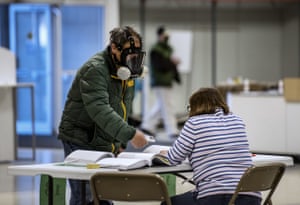
Dressed like a surgeon in a blue gown, gloves and a mask, the Wisconsin assembly speaker, Robin Vos, a Republican who opposed all efforts to stop in-person voting from taking place, swelled with pride at the scenes of Wisconsin residents fulfilling their civic duty in the midst of a deadly outbreak.
“You are incredibly safe to go out,” he assured constituents with a confidence belied by his ensemble.
The incredible comeback
Joe Biden finished fourth in Iowa, fifth in New Hampshire and a distant second in Nevada. With the weight of presidential history against him, the left-for-dead former vice-president looked to South Carolina for salvation.
His fortunes began to change with an endorsement from Congressman Jim Clyburn, the most powerful Democrat in South Carolina and one of only a few political figures in America with the power to move votes with a single blessing.
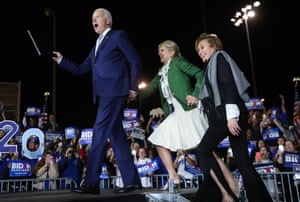
It was a blowout of epic proportions. He won every county in the state. Exit polls suggested that he won with white voters and black voters; voters with a college degree and voters without one; moderate voters and very liberal voters.
Over the course of a remarkable 72 hours, Biden’s centrist rivals folded and aligned behind him in a dramatic show of force. He swept to victory on Super Tuesday – going from loser to winner in less than a week.
In the end, South Carolina was far more than Biden’s firewall. It was a rocket-fulled jet pack that propelled his string of March victories and set in motion a political revival that longtime political observers swore they had never seen before.
The richest campaign in history
Mike Bloomberg, the former mayor of New York, spent nearly a billion dollars – that’s billion with a B – on a three-month presidential bid that triggered widespread fears – and plenty of criticism – that he might effectively buy the nomination.
Bloomberg, the 16th wealthiest man in the world, spent lavishly across the US, hiring thousands of staff and flooding the airwaves and internet with endless adverts. His approach was unorthodox: skip the early states and run up the score on Super Tuesday.
After rising steadily in the polls, Bloomberg won a place on the debate stage – where Senator Elizabeth Warren so thoroughly savaged his character and his record that she later claimed credit for drawing figurative billionaire tears – and earned a swath of negative publicity for his policies on minority rights as mayor and treatment of women as a media mogul.
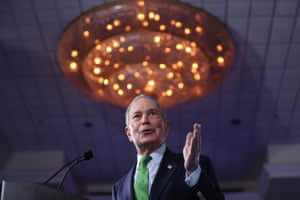
When the results rolled in on Super Tuesday, Bloomberg’s gargantuan effort yielded the grand prize of American Samoa. The US territory boasts a delegate haul of six, which he split four to two with the Hawaii congresswoman Tulsi Gabbard. Bloomberg promptly dropped out and endorsed Biden.
But the saga of his failed experiment continues. Former campaign staffers are now suing Bloomberg for fraud, alleging that he tricked them and thousands of other employees laid off last month into accepting jobs on the promise that they would be paid until the general election in November. Now many are without an income – and health insurance – as they weather the coronavirus pandemic.
The socialist in the lead
At the lowest point of Bernie Sanders’ second bid for the White House, he suffered a heart attack. The political prognosis was grim: his campaign would never recover.
Yet the “political establishment” – and the manifold other interests he rails against – had once again underestimated the Vermont democratic socialist.
In a matter of weeks, the perennial underdog charted an extraordinary rebound. Congresswoman Alexandria Ocasio-Cortez endorsed him. The left rallied. His poll numbers climbed.
Suddenly, days before the Iowa caucuses, national Democrats were in full panic mode: Sanders was a runaway train that must be stopped.
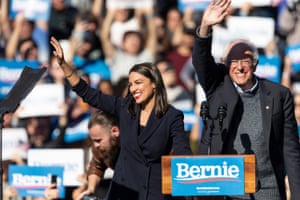
Sanders won the popular vote in Iowa and then picked off New Hampshire. Then, in Nevada, his political revolution finally arrived. He won across the board, dominating with Latinos and first-time caucus-goers. For a brief moment, before South Carolina changed everything, Sanders appeared unstoppable, his ascent to the nomination inevitable.
The collapse of the Iowa caucus
There are few political events in American politics as highly anticipated as the Iowa caucuses.
Presidential candidates spend untold resources and time in this state, endowed with outsized powers to set the course of national politics. But this year, the state would not be remembered for choosing the winner of the first presidential nominating contest.
Instead it was the site of a disastrous results reporting meltdown.
Caucus day arrived and residents gathered at churches, schools and gymnasiums for this quadrennial display of democracy in action. Hours passed without any results. Rumors began to circulate that an app designed to record and relay the tallies of this byzantine process had malfunctioned. By then, the reporting hotline was overwhelmed with callers. As night turned to day, it was clear the caucuses had gone farcically wrong.

The party did not officially certify the results until nearly a month after Iowans cacused. The Associated Press ultimately decided not to declare a winner.
The screw-up was later attributed to a combination of technical difficulties and human error. But the state may never recover – with speculation that it may lose its first-in-the-nation voting spot. After rounds of recounting and re-canvassing, riddled by inaccuracies and inconsistencies, the former South Bend mayor Pete Buttigieg was declared the delegate winner while Sanders won the popular vote.
On the evening of the caucuses, with no data to betray them, a procession of candidates trotted on stage to declare some version of victory before jetting off to New Hampshire with every intention of never looking back.
“Iowa,” Buttigieg declared, “you have shocked the nation.”
The candidates
Democrats have never had so many options for president. At its peak, the Democratic squad was large enough to field both sides of an entire soccer game, with subs.
There were six women; two black senators; an Asian American entrepreneur promising everyone $1,000 a month; a Latino former housing secretary; a gay small-town mayor who rose from obscurity to political stardom; a Hindu anti-war congresswoman; two billionaires and a self-help guru who vowed to “harness love” to defeat Trump.
But through it all two white men in their 70s – a former vice-president and the runner-up in the last Democratic primary – led the field for much of the race.
And, of course, through all those ups and downs, the end result of that enormous field was the one that national polls had predicted from the start: Joe Biden won.



